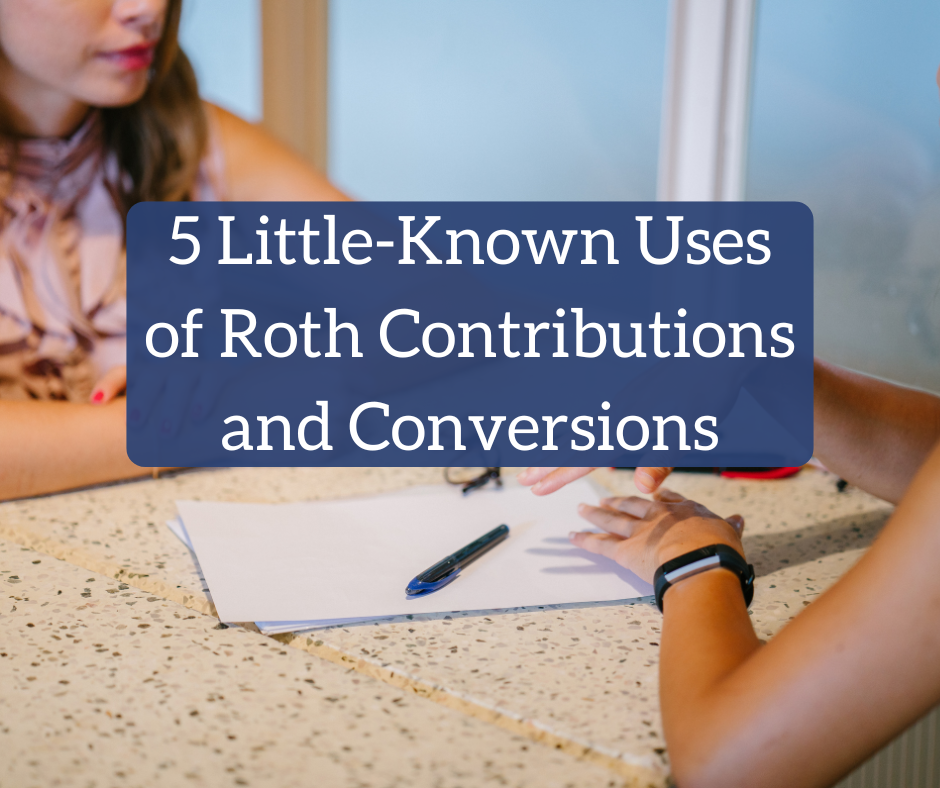5 Little-Known Uses of Roth Contributions and Conversions
Contributing to a Roth IRA is one of the smartest ways to get ahead in investing. Here are five extra reasons why. The post 5 Little-Known Uses of Roth Contributions and Conversions appeared first on The White Coat Investor - Investing & Personal Finance for Doctors.

 By Dr. Jim Dahle, WCI Founder
By Dr. Jim Dahle, WCI FounderMost white coat investors know what we're talking about when we use the word, “Roth.” Roth, from Senator William Roth in the 1990s, refers to a tax-free retirement account to differentiate those accounts from their more common cousin—the tax-deferred (traditional) account. You have likely already made the decisions about whether to contribute to a traditional IRA or a Roth IRA (usually a Roth IRA via the Backdoor Roth IRA process) and whether to contribute to a traditional or a Roth 401(k), 403(b), or 457(b) (usually the traditional during your peak earnings years unless you're a supersaver).
However, there are five uses of Roth contributions and conversions that you may not have thought about before. Today, we are going to discuss them. Remember as you read today that I carefully selected the links in this article. If you have not already read every one of these classic posts, you should do so today as you go through this piece.
Additional Benefits of Roth Contributions and Conversions
Roth contributions and conversions can be used to hedge your tax bets, protect from tax drag, nudge your behavior, improve estate planning, and protect your assets. Let me explain each in turn.
#1 Hedge Your Tax Bets
As a general rule, most doctors will pull money out of their tax-deferred retirement accounts at a lower tax rate than they saved when they put the money into the account. This is not only due to having less income in retirement (because they need less income to live) but because of the effect of filling the brackets. Unless you're a supersaver, this is generally a winning move. However, one nice thing about putting money into a Roth account, whether by contribution or conversion, is that you hedge your bets against a massive rise in taxes or massive future success in your life. Critics may argue that tax rates can also fall (and they're right, nobody expected the 2018 tax cut) or that if you are very successful in your life, then a little extra tax planning doesn't affect whether you run out of money (and again, they're right.) However, it is a great use of Roth.
#2 Behavioral Nudge
When running the numbers, I (and most others in this space) assume you are a cold, calculating homo economicus. However, the data is very clear that none of us are. Behavior matters, and it probably matters more than math. For example, if you are faced with a decision of whether to save in a tax-deferred or a Roth account and your marginal tax rate is 33%, the true decision is whether to put $10,000 into a tax-deferred account or $7,500 into a Roth account. However, your lizard brain doesn't necessarily see that, and the contribution limits for traditional/Roth retirement accounts aren't adjusted for that. Your stupid brain says, “I'm going to save $10,000; should I put it in a traditional or a Roth account?” Well, $10,000 in a Roth account is a lot more money after-tax than $10,000 in a tax-deferred account. By using a Roth, you've nudged yourself to save more money. Unless you are in the small club of people who have trouble spending their money, that's a good thing.
#3 More Protection from Tax Drag
Due to the ability to put post-tax money instead of pre-tax money into a Roth account, your ratio of retirement savings to taxable savings increases if you use a Roth account. This means more of your money is protected from the tax drag inevitable in a taxable account as it grows.
#4 Estate Planning Advantages
There are numerous estate planning advantages of Roth contributions and, particularly, conversions. The first is that a Roth IRA (unlike a traditional IRA, 401(k), 403(b), or 457(b)) does not have any Required Minimum Distributions (RMDs). So, that money can stay in the account until your death, providing more protection from tax drag. More of your money will also pass directly to your beneficiaries without having to hassle with probate or a trust. Your heirs can also stretch more of your money for an additional 10 years.
However (and perhaps most importantly), if you are wealthy enough to have an estate tax problem, you can shrink the size of your estate in the eyes of the IRS. The IRS is stupid when it comes to traditional/Roth accounts. It doesn't adjust how much you can contribute to the account if you choose Roth, and it doesn't automatically adjust the estate/gift tax exemption for Roth. Imagine your exemption is $12 million and you have $15 million, including a $10 million tax-deferred account and $5 million in cash. To keep things simple, let's assume both you and your heirs have a 40% marginal tax rate. If you died, your estate would owe around $1.2 million in estate tax. You decide to do a Roth conversion of that $10 million traditional IRA. It costs you $4 million in taxes. Afterward, you have a $10 million Roth IRA and a $1 million taxable account. Now, if you died, your estate would not owe ANY estate taxes. Yet your heirs still receive the same amount of money on an after-tax basis.
There actually is a solution to this issue. It's called “income in respect to a decedent.” Basically, the inheritor of the IRA can take a deduction equal to the amount the decedent paid in estate taxes on that tax deferred account. However, your heir has to know about this deduction and use it. I bet it gets missed a lot.
#5 Asset Protection
Increasing the ratio of your money in retirement accounts to taxable accounts not only reduces tax drag, it also improves your asset protection. In this regard, Roth conversions (and, to a lesser extent, Roth contributions) help protect your assets from creditors in the event of an admittedly very unlikely above policy limits judgment. Let's assume your retirement accounts are 100% protected from creditors in your state. Imagine you have a $5 million tax-deferred account and $2 million in cash. If you had no insurance and there was a judgment against you for $5 million, you would declare bankruptcy and your creditor would get the cash. You would start over with your $5 million tax-deferred account. However, if you had done a Roth conversion of that $5 million account a couple of years ago (long before injuring someone else), then you would have a $5 million Roth IRA and no cash. Now, you can declare bankruptcy and lose nothing or, more likely, incentivize the creditor to settle for pennies on the dollar.
None of these reasons are necessarily an argument to go 100% Roth all the time. But you should keep these additional benefits of Roth contributions and conversions in mind when making your decisions about contributions and conversions throughout your life.
What do you think? Which of these reasons have motivated you to make Roth contributions or conversions?
The post 5 Little-Known Uses of Roth Contributions and Conversions appeared first on The White Coat Investor - Investing & Personal Finance for Doctors.
What's Your Reaction?











.png?#)























